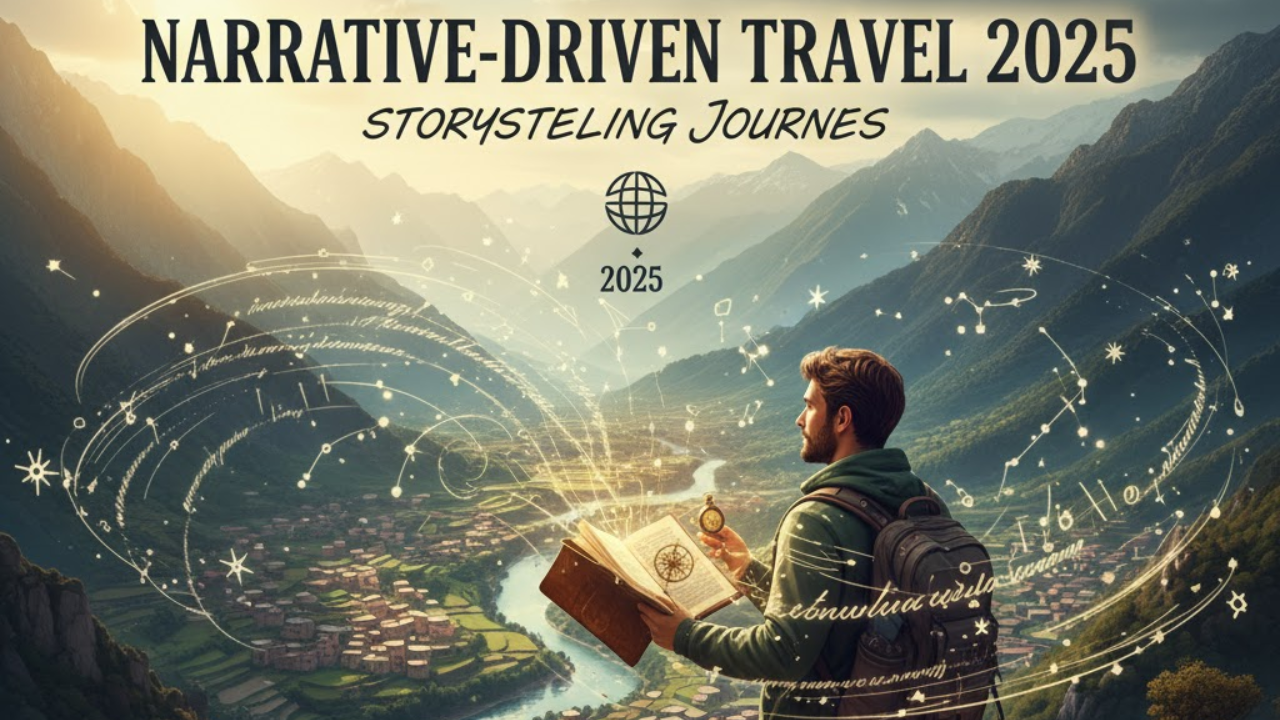You have not yet added any article to your bookmarks!

Join 10k+ people to get notified about new posts, news and tips.
Do not worry we don't spam!

Post by : Sameer Farouq
In 2025, travelers aren’t just visiting destinations — they’re living stories. A growing trend called narrative-driven travel is transforming how people explore the world. Instead of following rigid itineraries or tourist checklists, travelers are crafting journeys that follow themes, emotions, or storylines — turning each trip into a personal narrative.
Whether it’s following the path of an ancient civilization, retracing the plot of a favorite novel, or creating one’s own “hero’s journey,” narrative travel invites people to experience places through meaning, not mileage.
Narrative-driven travel blends storytelling with exploration. It’s a creative way to design trips based on a story arc rather than a list of attractions. The traveler becomes both the author and protagonist of their own experience.
For instance, someone might journey through Italy to recreate a Renaissance artist’s footsteps, explore Japan through ancient folklore, or design a trip around personal transformation — like moving from fear to confidence through adventurous activities.
The idea is simple but profound: every destination becomes a chapter, and every moment adds to your personal story.
In an age of social media overload and identical bucket lists, travelers are craving authenticity and emotion. Narrative-driven travel offers deeper engagement — a chance to connect with places through history, imagination, and purpose.
People want to feel their travels, not just document them. Story-based journeys create emotional resonance — they make the traveler part of something larger, turning exploration into self-expression.
Building a narrative journey starts with a central theme — a feeling, goal, or historical story you want to experience. Travelers then curate destinations, activities, and even accommodations that align with that narrative.
For example:
A “journey of rebirth” through wellness retreats and meditation sanctuaries in Bali.
A “lost civilization” story exploring ancient ruins in Greece, Egypt, and Turkey.
A “culinary discovery” theme tasting the evolution of Indian or Italian cuisine across regions.
A “romantic odyssey” following love stories from literature or cinema.
Each part of the trip serves a purpose, helping the traveler reflect, grow, and create lasting memories.
AI and travel tech are making narrative-driven experiences easier than ever. Smart platforms now create personalized story itineraries using traveler preferences — weaving together cultural, emotional, and historical threads.
Augmented Reality (AR) and Virtual Reality (VR) tools enhance the storytelling aspect — letting travelers step inside historical events or mythical tales at real-world locations. For example, standing in Rome and using AR to see the Colosseum as it looked 2,000 years ago brings the narrative to life.
This fusion of imagination and innovation is redefining how we experience history, culture, and creativity on the go.
Narrative travel taps into the human need for meaning and self-discovery. Every journey becomes a mirror — reflecting who you are, what you value, and what you seek. It’s not about luxury or distance anymore; it’s about emotional depth.
Many travelers use narrative travel for personal transformation — healing after loss, celebrating milestones, or finding new direction in life. These trips become symbolic acts of rewriting one’s own story through exploration and connection.
Tourism companies, tour guides, and hotels are quickly adapting to this emotional evolution in travel. Boutique agencies now offer custom storytelling itineraries — combining history, art, and local legends. Some even pair travelers with writers, psychologists, or filmmakers who help document the journey as a real narrative.
Hotels are curating themed stays — such as “Journey Through the Silk Road” or “Living the Myths of Greece” — offering immersive, educational, and emotional experiences. Travel isn’t transactional anymore; it’s transformational.
The next decade will see narrative-driven travel merge with AI travel design and immersive media. Soon, travelers may use voice-guided apps that narrate their journey in real time, blending history, emotion, and context.
We’ll also see the rise of story-based travel collectives — groups of people traveling together to co-create shared narratives, like modern pilgrimages or artistic expeditions. This future of travel will be defined not by luxury or location but by how deeply it moves you.
Disclaimer: This article is for informational purposes only. Travelers are encouraged to research cultural sensitivity and sustainability before participating in storytelling-based experiences to ensure ethical and respectful engagement with local communities.










Sri Lanka Ex-Intel Chief Arrested Over Easter Attacks
Former SIS Chief Suresh Sallay arrested by CID in connection with the 2019 Easter Sunday bombings th

Japan Reports Spike in Measles Cases Authorities Issue Alert
Japan confirms 43 measles cases in early 2026, prompting health authorities to warn potential contac

Korea US Clash Over West Sea Drill Communication
Conflicting accounts emerge on prior notice briefing, and apology during Feb 18-19 US air exercise i

Richard Liu launches $690M eco-yacht brand Sea Expandary
JD.com founder Richard Liu invests $690M in Sea Expandary aiming to produce affordable green yachts

China imposes export curbs on 40 Japanese firms over military ties
Beijing restricts dual-use exports to Japanese companies, citing remilitarization concerns, promptin

Malaysia moves to protect Musang King durian amid China impostors
Authorities safeguard Malaysia’s Musang King brand as durians from Thailand and Vietnam are being fa